Meet the young generation leaders driving their organizations forward.
Who says the office technology industry isn’t attractive to young people? That may be a problem for some organizations, but we have found during the past decade of writing about the industry’s young influencers that plenty of young people have found a home here and are making significant contributions.
Yes, there are young influencers who have grown up with parents in the industry, and even though this wasn’t their preordained career path, discovered after graduating from college that this is an industry rich with opportunity. You’ll meet a couple of these young leaders later on. Other young influencers have discovered it through internships and job searches. The six individuals—all under 40—that you are about to meet are some of the best and brightest young talent who represent the future of the industry.
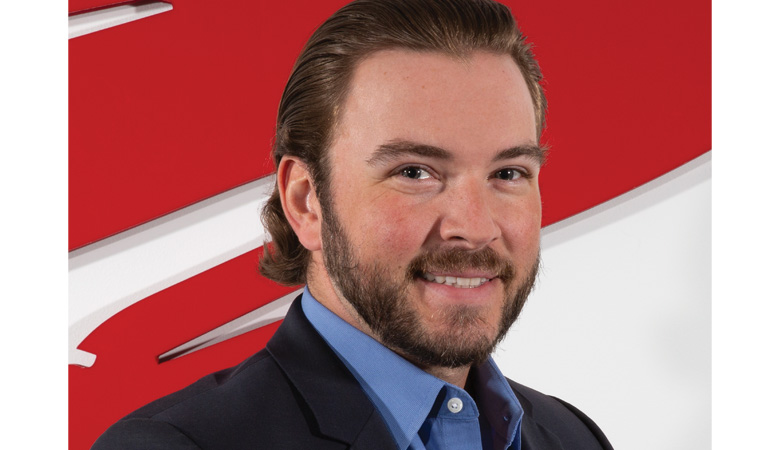
Josh Braendle, vice president of business development, Static Control Components, Inc. – Age: 38
Josh Braendle is a bit of a contradiction. “I’m in the print industry, and I don’t have a printer at my house,” he laughed. He knew early on that he wanted to pursue a career in business and got an associate’s degree in sales and business management at Pittsburgh Technical College. However, it wasn’t until his college internship at Static Control Components, based out of Raleigh, North Carolina, that he thought about the copier industry.
Josh spent four very educational years as an account executive with Static Control Components, learning how to meet with clients, understand their business needs, and match them with the right solutions. Static Control focused primarily on components then, so Josh’s clients were the manufacturers who took the company’s products and used them to assemble finished goods.
He took his initial experience at Static Control Compoents and ventured out into the wider business world, trying his hand at sales and business development at a series of other companies before one day getting a call that would bring him right back where he started, but in a very different role.
“I was approached by Bill Swartz, the son of Ed Swartz, who founded Static Control, to come back and take on a transition from being a component leader to a finished goods cartridge production leader,” recalled Josh. “I came back to spearhead that unit, and here we are 10 years later.”
Today, Josh manages a team of 15 sales reps across the United States and Canada. His team has a dual focus, supporting and growing Static Control’s traditional component manufacturing business on one side, and developing the finished goods cartridge sales opportunities on the other side, reaching out to independent dealers to talk technology and office products.
He’s seen a lot of change in the industry in just the past decade, particularly with Static Control’s educational clients that have converted rapidly to digital workflows, even on the student level.
“I look at certain school districts with a lot of people using tablet formats now instead of take-home homework like I was accustomed to in every single class, multiple sheets a day; there was significant page volume,” said Josh. “During the pandemic, a lot of those schools transitioned to the tablet. Once you’re on the tablet, you’re not going to convert back to a paper format.”
A more conservative, more traditional-minded executive might go astray trying to turn back the clock and get everybody printing out everything they work on like in the old days, but that’s where Josh’s youth gives him an advantage and perspective. It does no good to try and fight progress, and you never win that game anyway. His approach is not to oppose, ignore, or push back against change, but to accept it and adapt. A tech sale is still a sale, and print is far from dead.
“Overall, the page volumes are still significantly high throughout the market, and there’s still billions of dollars that get thrown into this industry year in and year out,” he said. “There’s always going to be a home for print. It just looks different year over year.
It’s not just the clients that are changing. When Josh first started in this industry, trade shows were the name of the game. What was once a packed year-round calendar of face-to-face events has shrunk to a few smaller regional conferences. Once, there were a convenient way to connect with clients from all over the country, but now Josh and his team have had to be more proactive to maintain that personal connection.
“Connecting with customers face to face has always been one of my faves and one of the things I love to have my team engage with,” he said. “As soon as we had customers willing to see us, we were seeing them and able to rapidly re-engage customers. That was a necessity for us in order to rebound the way we did post COVID.”
To do all this, Josh needs a team as aggressive and adaptive as he is, people who are motivated by success and have a strong drive to win, no matter the game.
“I was an athlete growing up, and building a culture of winning is one of my biggest things,” he said. “Building a team out, it’s really about making sure you fit in the culture side of it, because without culture, you can lose pretty quickly. We’ve done a good job of building our team based on the winning culture premise.”
A lot of the work of building a team comes after selecting the players, forging connections, offering recognition, and sharing success. Anyone can make it if they want to, but Josh does find that his best team members have a lot of things in common.
“I’m always looking for people that are outgoing, people that are hungry and want to do better for themselves,” he said. Success breeds success, so the productive years Static Control has been enjoying recently certainly don’t hurt his recruitment efforts.
“We’ve had some phenomenal growth year over year,” said Josh. “We have a full head of steam, and we’re excited. We have an energized group that continues to stay in the field and be engaged with customers week in and week out. Everybody’s happy.”
With everything that’s changed and with so much growth on his own part, it’s hard sometimes for Josh to believe this is still the same company he started with as a fresh-faced twenty-year-old, the ink still drying on his degree.
“Static Control, for the majority of its existence, was a family-owned company, so the majority of the people that I worked with when I was 20 years old are still here today,” he said. “They knew me way back when and 18 years later, we’re still firing away.”
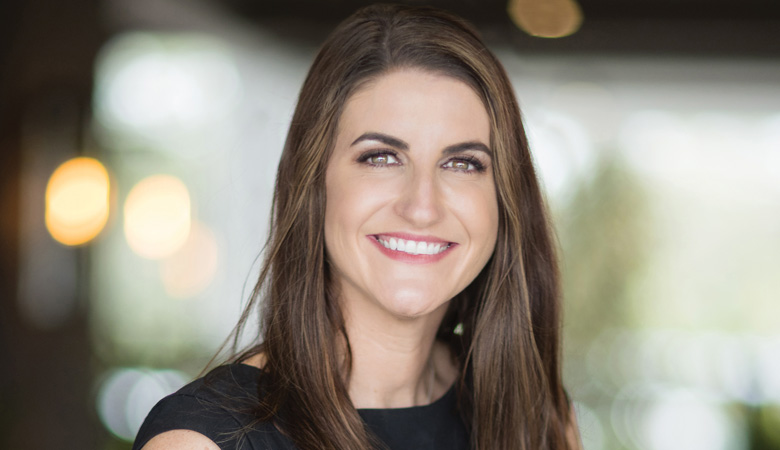
Young Influencer – Lauren Hanna, vice president of sales, Blue Technologies – Age: 37
“The gift of gab is in my blood,” said Lauren, who originally wanted to be a doctor before embracing that she was “born to be in sales.” As a child in 1995, she’d watched her father, Paul Hanna, do “kind of a Jerry Maguire, ‘who’s coming with me’ thing” and start Blue Technologies with three other founders.
“It was just so impactful when I was maybe nine or 10 to watch him build the company out of nothing,” she recalled. “That helps motivate me every day. He had three kids to feed, and he figured that out. I’m just so fortunate. We don’t all get the luxury of watching the founders found the company you work for as an adult.”
Despite the multigenerational history, Lauren balks at Blue Technologies being called a “family business.”
“We’ve always been tagged that way, but I’m the only employee that’s related to someone. Our culture is very family-business-oriented, but that’s not because of me, that’s because of how we view our team.”
Lauren wears a lot of hats, managing the production print team, the managed services team, the solutions and automation team, the major accounts team, and, as of this year, the entirety of Blue Technology’s IT company, Blue Technology Smart Solutions.
“I’m excited because it will help us bridge the gap between the two companies,” said Lauren. “It’ll help me integrate the IT and software side into our foundational copier model.”
One of Lauren’s favorite things about her role, and the office technology industry she works in, is the way it encourages the building of lifelong relationships with clients. She’s seen the partnerships that grow out of anticipating a customer’s needs and solving their problems, sometimes even before they realize a problem is on the horizon.
“Really, I hate to even call them customers because you end up partnering,” she said. “I can’t tell you how many of my customers will say, ‘Hey Lauren, would this help you, do you know this person?’ It becomes that partnership approach.”
For Lauren, the difference-maker really is relationship building. “Anyone can sell speeds and feeds,” she said. “We’re taking an approach to understanding what challenges our customers are facing today because the last three years have been so tumultuous.”
Tumultuous might be an understatement. COVID-19 wreaked havoc on the supply chain, with machines and, perhaps even more crucially, with repair parts being delayed by as much as several months during the height of the pandemic. Blue Technologies, being a single-line dealer, was inescapably impacted. Yet, despite it all, the company managed to have a record year, which Lauren credits to Blue Technologies’ hands-on way of serving its partners.
“Hourly, daily, weekly, it was about communicating effectively [with customers] and with as much information as possible, so that they felt heard, and understood how it was impacting their business,” she said. “We worked together to come up with temporary solutions to those challenges. If we didn’t have that relationship, it would have been a lot worse than it was.”
A huge part of the strategy that worked best then and continues to serve Lauren as she talks to clients now is giving them the space to tell her how their business operates, and what their pain points and goals are, before getting into Blue’s offerings.
“If you start talking about who’s your current IT provider, who’s your current copier provider, you’re bottlenecking yourself, backing yourself into a corner,” she said. “But if you start saying, tell me how the pandemic changed your business processes, and understanding that most processes need some kind of technology on-ramp that needs to happen, like a copier, then you’re positioning yourself differently. You’re speaking their language because you’re hearing their problem.”
Once the client’s problems are all mapped out, Lauren pivots to discussing solutions. Perhaps the prospect needs a copier with a print management solution, or cloud printing to support their newly remote workforce. “It could pivot so many ways,” she said. “The sales come naturally when you’re solving their business problem. When you’re building rapport, you’re gathering more information, so when you get to the demo phase, you’re offering a solution rather than just demoing a product.”
Lauren relies on a team that’s dedicated, curious, and willing to challenge her, which is what lets her know she can rely on them and not have to risk burning herself out doing everything herself. “If it’s just me, that’s not scalable,” she said. “The team has to have that same thirst for knowledge that I have, coming at it from many different avenues. We all get emailed to death, webinar-ed to death, but I think if you encourage curiosity, if you nurture that, then that’s where the best solutions come out of.”
The balance she tries to find is staying informed on advances in technology and the workplace, adapting to challenges, and embracing creative solutions, while still maintaining a connection to Blue Technologies/ core principles.
”A lot of people make the mistake of saying oh, generationally, it’s so different, you have to change everything. I don’t think you have to change anything. I think you have to evolve,” she said. “If we were to change every time the industry tried to fall into chaos, the last three years would have been really crazy. But we stuck to our core, and we’re very proud of our founding philosophies. Changing that would do us a disservice long term because that’s what our differentiator is.”
For Lauren, the key is patience, taking the long view. “Often people want to get into sales, they want to make President’s Club that first month, and it’s very short-sighted. Year three is everyone’s best year in our world because technology refreshes tend to come in waves of three years,” she observed. “You can’t just take it as a job. You need to look at what you like about technology. Don’t be off put by something as simple as a printer. Look at it from a global standpoint, where can that printer take me?”
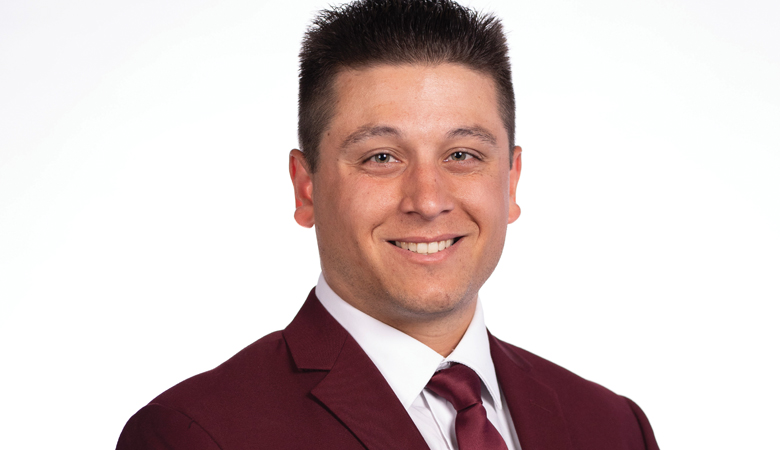
Young Influencer Justin Montalvo, director of technical talent acquisition, Impact Networking – Age: 28
Justin Montalvo originally thought he’d be a college baseball coach, even going so far as to pursue a degree in exercise sports studies from Benedictine University, but that career path came with an unexpected drawback.
“I realized once I graduated college that being a coach, your free time is everyone else’s busy time, and your busy time was everyone else’s free time.” Wanting to spend more time with family and friends, he pivoted to looking for a job in the corporate world, ultimately joining Impact Networking as its first IT talent recruiter.
Unexpectedly, this was a role that actually made direct use of his experience as a college baseball player. He’d been involved in his college’s efforts to recruit incoming freshman players and found he had a knack for building a quick rapport with the high school athletes who were interested in his school’s program.
“That was something I really found a passion for,” he said. “I was proud of the school that I went to and the baseball program that I played for, so it was just kind of natural to sell that opportunity to students, and that translated very well to the corporate side. When I’m talking to candidates, I want to give them that same opportunity that I had for growth and career advancement.
He added, “I can talk about the opportunity in the future all day long, and as long as I’m seeing it, I feel good about it, but the candidate has to see it.”
Candidates sometimes come in focused on their immediate future, and what the job can do for them right then and there, but Justin sees part of his role as helping candidates think longer term and see the bigger picture.
“There are a lot of instances where we can still win a candidate with what we’re able to offer right now, but it really is about the future and the vision that the executive leadership team has,” he said. “If we don’t meet their initial, very surface-level needs, hopefully, we do meet their future needs.”
In Justin’s case, working at Impact Networking gave him what he needed initially, which was better work-life balance and something he could feel passionate about.
“When I came to Impact Networking, I was 23 years old, so I didn’t have a whole lot of leverage in terms of salary,” he said. “I was just looking for my foot in the door, but it was the opportunity for growth that really pulled me in, the fact that I was going to come in as their first IT recruiter and really blaze my own trail from there.”
Justin now tries to take that same approach with his recruits. Whether they’re recent grads just looking for that same foot-in-the-door start or seasoned professionals, he shows them the opportunities Impact offers for advancement. “If you come in, you perform, and you produce, you’ve got nowhere to go but up,” he observed.
The talent acquisition team at Impact Networking is divided into two different areas, focusing on recruiting sales talent, marketing professionals, and admins to support Impact Networking’s managed marketing services department, and Justin’s division, recruiting a wide range of tech talent doing everything from cybersecurity to software development to machine service. While Justin is primarily focused on growing and developing his team, he still finds himself talking directly to talent day-to-day. “That’s the Impact Networking way,” he said. “Even when you’re a leader, you are very much on the front line.”
One of the primary challenges in Justin’s line of work is simply keeping up with the bottomless demand for tech talent. While recent layoffs at big companies have freed up a lot of highly skilled workers, the demand is endless. “It’s still a very, very competitive hiring market because even though there are more candidates, there are still a ton of job openings in the technical space,” he said. “Everybody wants IT talent because technology is moving very quickly. It’s never moved this fast before and will never move this slow again.”
While Justin’s relative youth gives him some advantages when trying to connect with fresh college graduates, the modern college student’s experience has been so different from his own, even just six years earlier, that he’s keenly aware of a divide in their life experiences just due to how much COVID, which hit after he graduated, changed the college environment.
“Students got that taste of being able to get their work done remotely, and I never had that experience,” he said. “Even entry-level students, they’re looking for hybrid, they’re looking for remote, but they don’t really understand that the best experience you’re going to get is by coming into the office. That’s how you’re going to grow the quickest, but they don’t see it that way.”
Justin is proud of the office culture Impact Networking has built, which is back to a traditional five-day-a-week, eight-to-five schedule with a conscious focus on togetherness and collaboration. He likes that Impact Networking, with its diverse portfolio of technologies and the wide array of industries it serves, “matures you very quickly.”
In fact, one of the surprising realizations from his line of work is that some of the mid-career candidates he meets with don’t have as wide a range of experience as Impact Networking provides. “I learn a lot on the job by speaking with candidates, but I also feel like I’m educating a lot of these professionals in things they didn’t even know,” he said. “There’s definitely a fine balance.”
Impact Networking maintains a varied portfolio of clients primarily because the company doesn’t limit itself to targeting just one or two industries, and it takes that same long-term thinking approach to its own revenue streams. “As long as you’re a growing company, you’re a prospect for us,” said Justin. “We’d rather a company pay us $10,000 a month but be growing as an organization versus a company that’s just looking to maintain but is willing to pay us $15,000. We want that account that wants to grow, and wants to use our services and solutions as a catalyst for that growth.”
To any young workers thinking of getting into recruiting, Justin is here to encourage them. “Take the chance, because recruiting is a very fulfilling position,” he said. “You’re going to learn a ton, you’re going to speak to a lot of people, and you’re going to make a difference in somebody’s life, whether they’re coming from the unemployment line or just capped out on a plateau in their career. There’s no better feeling.”
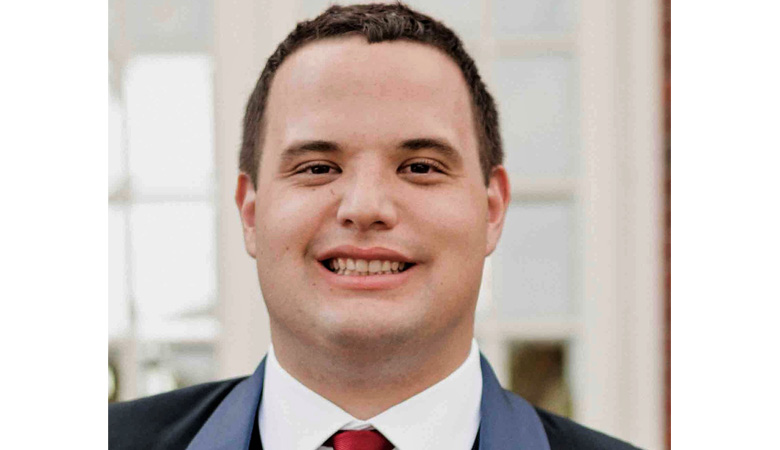
Young Influencer Eric Pitassi, regional manager, Pacific Office Automation – Age: 30
Eric Pitassi grew up around copiers, but never thought it was the life for him. “My father [Doug Pitassi] was in the industry, so I grew up around Pacific Office Automation (POA) and the copier industry,” he said. “My dad sold copiers, but I really didn’t know what that meant and the complexities that went with it. It was something that I never envisioned doing myself.”
His passion was sports, playing football for Linfield University, and pursuing a degree in physical therapy. He pitched in at Pacific Office Automation over the summers, working in the warehouse or parts department whenever his sports were in the off-season, but it wasn’t until he took an opportunity to do a sales internship there that he started to reconsider his career path.
“I was always kind of a shy kid growing up, and I think my dad thought, it’s probably not for him, but I tried it and thought, you know what, I can talk to people,” he said.
It was hard to notice day by day, but over Eric’s four years in college, he’d shed a lot of his shyness and become more confident, something he credits to his athletic career. “I’m a huge believer in organized athletics,” he said. “It forces you to work as a team, and forces your communication and conflict resolution skills. I was a dramatically different kid just by the end of college, and I was a lot more confident in talking to people.”
Today, he oversees the Southwest territory for Pacific Office Automation, setting up new branches in California and Nevada, building each team, and putting out whatever fires come up. It’s an aggressively people-focused profession and that suits Eric just fine. He puts a premium on face-to-face communication, both with clients and with teammates.
“When you’re getting down and building relationships, new business, I think that should be done in person,” said Eric. “It’s easy to be distracted answering emails or thinking about your next meeting when you’re not in person. In person, you’ve got to give your full, undivided attention, and if you’re not paying attention it’s pretty obvious.”
The region he oversees is one not many companies find easy to break into. It’s large both geographically and demographically, with as much diversity in people and in industries as can be found anywhere.
“Every dealer that’s ever tried to come down to Southern California warned us it’s a different beast, and in some ways I think it is, but at the end of the day, a copier deal is a copier deal, and a person is a person,” Eric said. “People want to do business in a way that makes sense for them, and typically they want to do that with people they get along with and have relationships with.”
Eric’s approach to growing in the territory has been about patience and deliberate strategy, focusing on organic growth. “We’d rather start smaller and grow through customer acquisition,” he explained. “If we’re going to invest, we’d rather invest in our people and in going after specific contracts with customers. We don’t want to go buy a big portfolio.”
Even with the strong foothold POA has established in the Southwest, the business climate is a challenging one. Inflation, supply chain constraints, and a little lingering post-COVID skittishness are all problems Eric’s had to tackle head-on.
“You can’t ignore that interest rates are really high,” he said. “Our industry is equipment leasing and financing. You can’t ignore that borrowing money today is more difficult than it was. You’re not seeing 2% mortgages. It’s understandable for customers to be a little more reluctant. You talk to the average customer, they’re a little more conservative than they maybe were pre-pandemic.”
Even so, recovery has been slow and steady, with consumer confidence rising despite soaring interest rates. While Eric admits he wasn’t old enough to be in the workforce during the post-recession bounce-back years of ’08 and ’09, the current recovery phase seems strong compared to what he knows of it. Clients are shedding some of their pandemic-era caution and taking steps to grow again, and things are feeling a lot more like 2019. “It’s definitely as normal as it’s been since the pandemic occurred,” said Eric.
From what he’s seen, there’s no lack of customers wanting to do business or the more limiting problem of banks not wanting to do business with them. “We saw during the early pandemic stages, certain companies just don’t want to lend money,” said Eric. “I don’t think there’s an overwhelming issue with finance companies or manufacturers stopping you from doing business now, whether it be supply chain or holding-credit issues.”
The main question now is really whether Eric can develop enough talent to keep up with demand. “For us, manpower development is huge,” he said. “If we can give someone the opportunity to grow within our organization, take on a bigger responsibility, if it makes sense for them, we want to give them that opportunity.”
Eric looks for candidates who are ready to make a commitment, both to their careers and to themselves. “There’s a lot of advice going around in the education system today to try a couple jobs and figure out what you want to do, and I don’t know if that’s the best advice, personally,” he said. “I think you should work your hardest to master a skill. Once you have a skill mastered, whether or not you end up using it, learning how to master that skill is still valuable.”
Eric wants to see students who make the most of the opportunities they have to learn in an environment without the real-world pressures of the workplace, because—one way or another—it takes experience and maturity to be ready to reach your full potential on the job.
“Ultimately, if you want to be an entrepreneur, you have to have an aggressive mindset to be able to take on those risks confidently,” said Eric. “Sales is a great opportunity to achieve some high-income goals and have some freedoms, but it’s a lot scarier. It’s always easier to make decisions once you’ve conquered a mountain.”

Young Influencer Melissa Schielzo, product management specialist, Sharp Imaging & Information Company of America – Age: 30
After graduating college in 2015 “with a mountain of debt,” Melissa Schielzo, now a product management specialist at Sharp, worked as many as six jobs at a time to pay it down, doing everything from lifeguarding to coaching a robotics team for the Girl Scouts of America.
Coaching the Girl Scouts’ robotics team eventually progressed to working for the organization full time, in roles that sent her traveling around Northern New Jersey running STEM programs for girls from kindergarten through twelfth grade. “I would say to the leaders that I worked with when I was teaching, if I can make a difference in one girl’s life, then I’ve done my job,” said Melissa.
If wearing that many hats wasn’t enough to teach her how to be adaptable, 2020 had another lesson in store. She was in grad school when COVID hit, canceling a much-anticipated college trip to Singapore. “We ended up doing a virtual tour at home,” she said. “I made dumplings at home with people in China at the same time live. The school really tried to make it special for us even though it was not what anyone thought it was going to be.”
Coincidentally, just two weeks before COVID hit, Melissa had been put in charge of figuring out a strategy for allowing the Girl Scouts to run programs virtually, as the Mobile Girl Scout Experience Program Manager. This ended up giving her an unexpected and huge advantage when it was time to adjust to the remote work era.
“Because of my background in technology, I already knew how to use Zoom,” she said. “I knew how to send out meetings, and I was the one teaching everyone else how to do it. Because I’m a graphic artist, I created PDFs of badge work for girls to do at home because no one knew what to do. Schools weren’t set up yet. Some people didn’t have laptops or computers at home.”
Melissa was always drawn to tech. As a ‘90s kid, she grew up with it. “It’s something that’s always been around for me.” She wanted to share that experience with the girls in the scouting programs she ran, especially the more she learned about it.
“There’s a lot of opportunity in the industry,” she observed. “I’ve done a lot of research and I’ve actually experienced it. Girls and women are very hard on themselves. We don’t take risks as much as our male counterparts because we expect perfection.”
For Melissa, that means getting out of her comfort zone and accepting imperfection and taking risks, no matter how hard that seems at times.
“Yeah, it’s going to be uncomfortable,” she said. “My undergrad, I was one of five women. My graduate school, I was one of three.” Knowing who she was and what she wanted helped Melissa stay focused even on the most difficult days.
All that perseverance paid off. Shortly after grad school, Melissa started at Sharp, connecting with dealers all over the country about products such as their A4 printer line or the new Dynabook laptops. Another thing school prepared her for: Melissa is currently the only woman in her group of 5-plus team members. “After working for Girl Scouts, it’s a welcome change,” she laughed. “Everyone’s very kind. We all work on a lot of different things, but we come together.”
The job is fast paced, with crunch time around every new product launch.
“This year is really the year that we are rolling out almost all of our new products for the A4 line, so it’s coming fast and furious,” she said. “We are in the process of rolling out one right now and getting started on the next one.”
Although Sharp, like many companies, has been back in the office for a while now, since Melissa works with dealers all around the country, most of her meetings are virtual. “If they can make it here or we can go there, then we will, but it’s few and far between these days, especially when we have (Microsoft) Teams at our fingertips,” she said.
It’s just one of many aspects of the job that connect surprisingly well to her experience with the Girl Scouts, a testament to Melissa’s try-anything attitude. One can really amass a wide range of experience working six jobs at a time, although she’s grateful to be down to just one job now.
Working at Sharp may not be as adventuresome as scouting, but Melissa finds plenty of things about the job to excite her, especially as she’s still so new in her career there, having only just hit her one-year mark. This is an industry typified by long-tenured careers, and with luck, Melissa’s will be one of them.
“I see myself growing within the company as much as possible,” she predicted. “There’s a lot to learn, and I’m learning every day. If you stop learning you know it’s time for a change, and I don’t see me stopping learning any time soon.”
For Melissa, the secret to success was accepting reality while never letting any frustrations about her present circumstances limit her view of the future or her commitment to making her dreams a reality. She couldn’t even say how many versions she drafted of her résumé, trying different formats and keywords hoping to find the secret combination that would make hers float to the top of hiring managers’ inboxes. She knows her master’s degree helped her stand out, but her wide range of work experience, and the gift of confidence and adaptability all those jobs gave her have helped too.
“It wasn’t easy for me; you just have to keep pushing,” she said. “Until you get to where you think you should be or where you are comfortable for that time being, you’re always looking for something else. So you don’t have a job right out of school, that’s okay. I didn’t either. You just have to figure it out and hope you’re lucky enough to be noticed.”
And now, dozens of jobs and hundreds of résumés later, Melissa’s finally in a career that lets her live life the way she always wanted to.
“I’m down to one job, and I work for Girl Scouts on weekends for fun,” she said. “I have a work-life balance, and I can actually have nights off. It’s very exciting.”
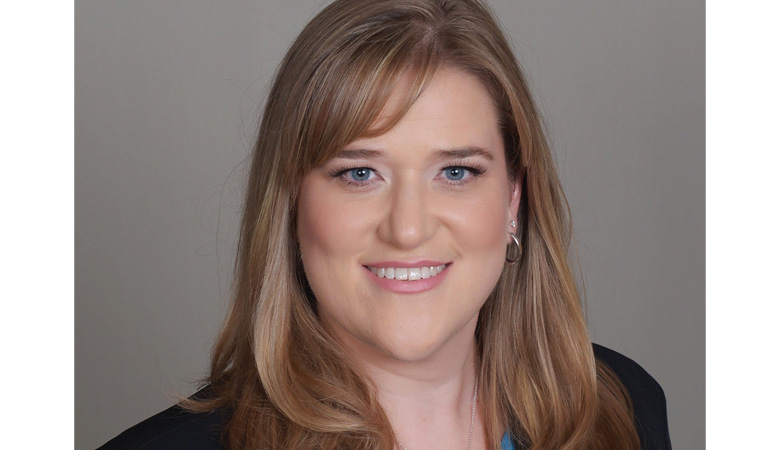
Young Influencer Michaela Winkel, assistant general counsel, Toshiba America Business Solutions – Age: 35
“There’s no linear path to getting into law school,” says Michaela Winkel, assistant general counsel for Toshiba America Business Solutions. “My family always told me when I was growing up that I should be a lawyer. I was kind of argumentative with them at the time,” she laughed.
Michaela moved around a lot as a child, becoming adept at adjusting quickly to new places and new people. The one constant was school, where she excelled with a precocious ability to focus on her goals and follow them through. “I always thought I can’t always have an impact on where I was living, but I could focus 100% on what I was doing within those environments.”
Always an eager student, Michaela entered undergrad at Arizona State with one thought in mind: law school. “I guess I’ve always just been a motivated individual,” she said. “I’ve always been pretty sure of myself and what I wanted to do.” She knew being bilingual would be an asset, so she took time to pursue a minor in Spanish and kept her grades high, getting accepted into law school just as she’d planned, at Chapman University in Orange, California.
As she worked internships ranging from insurance to sports marketing, Michaela came to the realization that she was looking for something that had a bit more work-life balance than a usual law firm. In-house corporate law, with its interesting mix of both business and legal work, jumped out to her as a possibility, but her advisors at school warned her that this was a long shot. Most in-house lawyers are established professionals with years of work at a law firm under their belts. The number of fresh law school grads who go directly into corporate jobs is extremely rare, but Michaela was undeterred.
“I was always thinking what can I do now to set me up to get to where I want to go? It took a lot of planning, but I knew myself, and I knew what the ultimate goal was,” said Michaela. “I wanted to prove everyone wrong.”
Michaela set out to gather as broad of a knowledge base as possible, electing to take classes that didn’t have a singular focus and pursuing an array of internships, clerking opportunities, and clinics ranging from mediation to working with filmmakers. Knowing that being bilingual could be a differentiating factor for her, she continued her studies in Spanish.
Her strategy paid off. Just as Michaela was completing her California state bar exam, the career services department at her law school, Chapman University, reached out to let her know Toshiba had seen her résumé and they liked what they saw, especially the fact that she was bilingual.
“It ended up being the perfect fit,” she said. “I’ve been here almost 10 years, and it was exactly what I’m looking for: having that opportunity to start at an in-house position in a small legal department, getting a lot of experience as I transition from that law school environment into the work environment, and putting my legal degree to use.”
Michaela is what lawyers call a generalist, doing “a little bit of everything.” At Toshiba, that means labor and employment, mergers and acquisitions, contract reviews, risk analysis, and general legal counseling for business groups, marketing groups, and legal compliance.
“I didn’t want to have billable hours and be working 100 hours a week,” she said. “If you wanted to work 80 to 100 hours a week here you could, but it really takes an individual to set that work-life balance for yourself.”
This isn’t at all what the stereotypes of the legal profession would indicate is possible, but Michaela made a commitment to living a well-rounded life just as she did to find her perfect career.
“Understanding we’re here to do a job, we’re here to be responsive, but also making sure you’re setting aside time for your life outside of work as well, participating in hobbies that you enjoy and getting outside,” she said. “I’ve found over the years, it’s constantly a challenge. It does take some practice and getting used to, and there are tweaks along the way, but for the most part, I would say I have it figured out, and I’m very happy.”
Another unexpected advantage of choosing Toshiba is that the legal department is small. Just three people, in fact: Michaela, the general counsel, and a paralegal. They work on a 50/50 hybrid schedule, another act of maintaining a balance that Michaela appreciates. “I think this is the future of the work environment and how I see a lot of businesses proceeding,” she said.
Being a generalist keeps the job exciting, even after a decade. Michaela’s work touches so many different corners of Toshiba’s business that there’s always something new to learn and different problems to tackle.
“I didn’t realize coming out of law school how important it would be to be in a small legal department,” she said. “You may think you know what you’re walking into, you kind of have a plan, and something new and exciting could pop up. It keeps you on your toes, and that’s what I like about it. I’m not just in one singular practice area. I have a general knowledge base of everything that’s going around and working closely with our business groups has been really rewarding.”
Also rewarding is the satisfaction of knowing Michaela chose the right plan and executed it well. “I was told no so many times along the way, with respect to when I got to law school and I told our career services office that this was my plan coming in,” she said. “They said that’s great, but it’s very, very unlikely and that’s probably not how it’s going to happen, so we need you to accept that you may have to take a different path. I don’t know if this is just the lawyer in me, but I was like, you can say no to me, but this is where I’m going to go. This is the path I want.”




